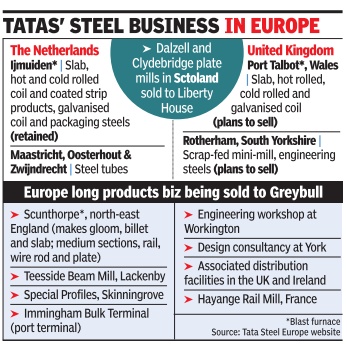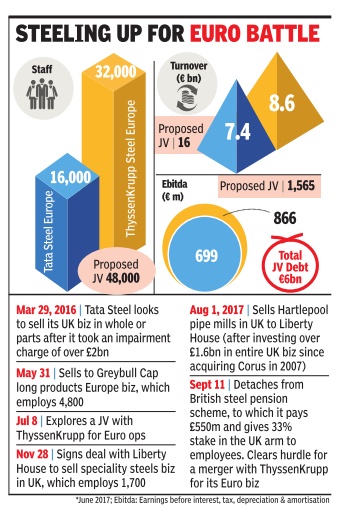Tata Steel
This is a collection of articles archived for the excellence of their content. |
Tata Group's overseas takeovers

See graphic:
TATA's steel business in Europe
2017: alliance with ThyssenKrupp

A decade after its buyout of Corus, Tata Steel is scaling down its investment in Europe. Tata Steel and German group ThyssenKrupp have signed an agreement to combine their steel businesses in Europe in a bid to create the continent's second largest steel firm, after ArcelorMittal.
The new company , to be named ThyssenKrupp Tata Steel, will have an estimated turnover of 15 billion euros and will employ 48,000 people. The merger will help Tata Steel lower its debt burden as it will knock off 2.5 billion euros (Rs 17,000 crore) from its balance sheet. Tata Steel has a debt of Rs 75,000 crore.Both Tata Steel and ThyssenKrupp will hold equal stakes in the new company , which will have a capacity of 21million tonnes. The agreement comes more than a year after Tata Steel decided to explore a JV for its loss-making European business with the $46 billion ThyssenKrupp.Last week Tata Steel hived off its British pension scheme, which was an obstacle in its talks with ThyssenKrupp. Tata group chairman N Chandrasekaran said deal will allow the steel company to focus on domestic market and grow the business, through various channels, including acquisitions of stressed assets.
Tata Steel, under Ratan Tata's leadership, had entered the European market through the $13-billion acquisition of Corus in 2007. The buyout of Corus, rechristened as Tata Steel Europe, was the biggest M&A by an Indian corporate. However, the acquisition did not turn out to be profitable for Tata Steel. In March 2016, the company , then led by Cyrus Mistry , announced its exit from the British market because of continuous losses that forced it to write down over £2 billion.The new merger agreement will mark a major reduction in exposure for Tata Steel to the European market.
To be headquartered in Amsterdam, ThyssenKrupp Tata Steel will house both the companies' assets and liabilities. Tata Steel has plants in Ijmuiden (the Netherlands) and Port Talbot (the UK), while ThyssenKrupp has a unit in Duisburg (Germany). Tata Steel will shift 2.5 billion euros of debt to the proposed JV while ThyssenKrupp will transfer pension liabilities of 3.6 billion euros.
Tata Steel and ThyssenKrupp, which see cost savings of up to 600 million euros per annum from combining their businesses, hope to complete the deal by March 2019. Heinrich Hiesinger, chairman of ThyssenKrupp, said the merged entity will be in a better position to cope with the structural challenges in the European steel industry . The industry is affected due to overcapacity and dumping by Chinese companies. Post the merger, Tata Steel's stake in the new company will be recognised as an “income from investment“.